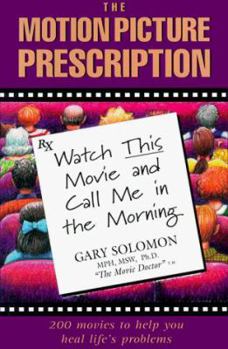The Motion Picture Prescription: Watch This Movie and Call Me in the Morning
Select Format
Select Condition 
Book Overview
"Films are our stories, " says Solomon, and stories have been used therapeutically since primitive humans first began to spin tales around campfires. One thing remains constant: stories can teach, and... This description may be from another edition of this product.
Format:Paperback
Language:English
ISBN:0944031277
ISBN13:9780944031278
Release Date:January 1995
Publisher:Aslan Publishing
Length:256 Pages
Weight:0.94 lbs.
Dimensions:0.6" x 6.2" x 8.9"
Customer Reviews
5 ratings
Add this one to your other "Best Films" books --
Published by Thriftbooks.com User , 16 years ago
With my subscription to NetFlix I've been able to seek out and order a wider variety of films that one finds in Blockbuster and other neighborhood video rental stores. As such, I've bought a variety of "Best Films" books to help me select classic or unusual movies that I usually wouldn't know existed. This is one of those books. While intended as a guide for therapists and individuals wanting to confront personal issues -- and who doesn't have a issue or two to work on? -- it's also a good resource to use to simply identify a good, interesting and thought-provoking movie. Two hundred films are served up, alphabetically with a list of "healing themes" listed at the top. Also included for each is: a notation of the cast, director and screenwriter; a four-to-five line synopsis of the plot; a twenty-line discussion of the healing themes; "points and issues" to focus on; and, directions as to what to look for in each. I like the different (psychological) perspective this book offers -- as most of my other film guides focus on screenwriting and film making techniques, the number of awards won, etc. Instead, this one offers viewers interested in positive self-improvement a way to select titles that are useful and interesting. The author -- Gary Solomon -- is a trained psychotherapist. At the time the book was published, he was Director of the Oregon Psychotherapy Consortium. He holds a bachelor's degree in psychology and a master's in public health from UCLA, a master's in social work from USC, and a Ph.D. from Arizona. Highly recommended for college and public library collections and individuals interested in cinematography and self-improvement. R. Neil Scott Middle Tennessee State University
exploring our inner selves through film
Published by Thriftbooks.com User , 20 years ago
Many counselors and therapists may informally make use of movies to help people explore important psychological issues. "The Motion Picture Prescription" lists "200 Movies to Help You Heal Life's Problems", as the subtitle puts it, with brief synopses of the films, short lists of "healing themes" in them, and comments about the key story elements. For example, Solomon writes about "Rain Man" (with Dustin Hoffman as the autistic savant brother to Tom Cruise, unknown to him for decades): "Some families keep secrets that eventually come to light, leaving those who are still alive to deal with the legacy of the family lies. There's no room for secrets in a loving relationship... Can you see Charlie [Cruise] was taking his anger out on Raymond [Hoffman] when he was really feeling hurt and sad over his father's abandoning him?" Also included is a chapter with specific, usually common-sense suggestions, and an index of the 200 films in various theme categories.
Gaining Insight About Life at the Movies
Published by Thriftbooks.com User , 24 years ago
Reading this book helped me see into an issue that perplexed me in life: why helping others could be my way of using others to meet my own needs. By watching When A Man Loves a Woman, I could see how a 'fixer' needs someone to fix to feel 'good,' even if that means wanting/needing someone else to stay broken.It was a painful truth I could not see about myself when it was explained to me, but one I could see clearly by watching this film and using the cues offered in this wonderful book.Of the many valuable insights I gained about myself from this book, one other stands out. I'd spent a lifetime listening to ernest friends explaining why my esoteric, off the wall humor was 'off-putting' to people who didn't know me. Watching a film with a character who sat in the background making esoteric, off the wall comments, I finally understood in a deep, clear, embarassing way what my friends had been trying to tell me: I was unintentionally coming across as strange anddisconnected to others. I believe this book does a great service by bringing therapeutic insights and healing to people who cannot afford therapy. In my case, it also offered a way for me to learn about myself in a quiet way, without feeling a need to defend, explain or justify myself: I was just watching a movie.As a character comments in When A Man Loves a Woman, 'Denial's not just a river in Egypt.' With the help of this book, I could see truths I'd denied about myself.I recommend this book heartily to others struggling with life issues.
Self-Help on the Hurry Up
Published by Thriftbooks.com User , 26 years ago
I was skeptical when I read the book but when I put the author's suggestions into practice I found it to be a great experience. As an added bonus I got to enjoy some movies that I never would have watched otherwise. The key is to follow the author's suggestions about how to use the movies in one's healing process and not just watch the movie(s). I highly recommend the book particularly for those who want to explore relationship issues.
A very resourceful tool for the journey of life.
Published by Thriftbooks.com User , 27 years ago
This book helped me to understand the complexities of several of my own struggles. I was able to look up a movie with a similiar theme or situation and use it to see the my situation as an observer.






